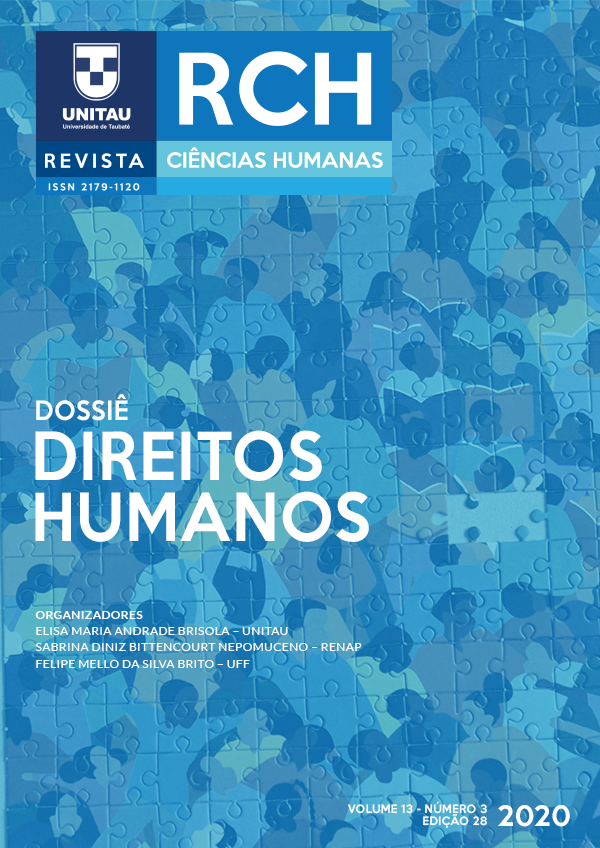A EDUCAÇÃO EM FAVOR DA EMANCIPAÇÃO DAS MULHERES NEGRAS
DOI:
https://doi.org/10.32813/2179-1120.2020.v13.n3.a695Palavras-chave:
Direitos Humanos. Mulheres Negras. Inclusão.Resumo
Este artigo pretende apresentar reflexões sobre o processo de emancipação para as mulheres negras. De cunho bibliográfico, traz em seu bojo as relações entre direitos humanos, educação, gênero, raça e classe em nossa sociedade estruturada pelas hierarquias sociais. Evidencia-se que é imprescindível a educação para reivindicação por direitos. A educação, assim, mostra-se um instrumento poderoso para liberdade, possibilitando acesso ao conhecimento. Objetiva-se aprofundar teoricamente estas reflexões sobre a aquisição do direito à educação ao longo do desenvolvimento da humanidade para as mulheres negras e a importância das políticas de ações afirmativas para materializar os objetivos constitucionais e da Agenda 2030 da Organização das Nações Unidas. Visa-se promover um repensar reflexivo sobre a situação das mulheres negras, e as chances de aumentar as oportunidades sociais e serem reconhecidas como sujeitos produtores de conhecimento.
Métricas
Referências
BATISTA, W.M. O meu lugar é onde eu quiser estar. Portal disparada, disponível em: https://portaldisparada.com.br/cultura-e-ideologia/o-meu-lugar-onde-quiser-estar/ acesso em: 10 de setembro de 2020.
BATISTA, W.M. Sobre a política de cotas no Brasil. Portal disparada, disponível em: https://portaldisparada.com.br/politica-e-poder/sobre-a-politica-de-cotas-brasil/, acesso em: 10 de setembro de 2020.
BERTH, J. Empoderamento. São Paulo: Sueli Carneiro; Jandaíra,2020.
COLLINS, P.H. Pensamento feminista negro. 1º ed. São Paulo: Boitempo, 2019.
CROSARA, D. de M., & Silva, L. B. e. (2018). A Constituição Federal de 1988: os caminhos das políticas de democratização do acesso e permanência na educação superior como direito fundamental. Revista Educação E Políticas Em Debate, 7(2). https://doi.org/10.14393/REPOD.issn.2238-8346.v7n2a2018-07
CURRY, C. R. J. Direito à educação; direito à igualdade; direito à diferença. Cadernos de Pesquisa, n. 116, jpu.l h2o4/52-20602, julho/ 2002.
DAVIS, A. Mulheres, raça e classe. 1º ed. São Paulo: Boitempo, 2016.
DAVIS, A. Mulheres, cultura e política. 1º ed. São Paulo: Boitempo, 2017.
FREIRE, P. Pedagogia do oprimido. 17º ed. São Paulo: Paz & Terra, 1987.
GOMES, Nilma Lino. O movimento Negro educador: saberes construídos nas lutas por emancipação. Petrópolis, TJ: Vozes, 2017.
GONZALES, L. Racismo e sexismo na cultura brasileira. Revista Ciências Sociais Hoje, Anpocs, 1984, p. 223-244.
HOOKS, Bell. Olhares Negros: Raça e Representação. Editora Elefante, 2019
LIMA, Márcia. Trajetória educacional e realização sócio-econômica das mulheres negras brasileiras. Revista Estudos Feministas. IFCS/UFRJ, vol. 3, n. 2, 1995.
MASTRODI, J; BATISTA, W.M. O dever das cidades includentes em favor das mulheres negras. Revista de Direito da Cidade, vol.10, n.3, 2018, p.862-886. Disponível em: https://www.e-publicacoes.uerj.br/index.php/rdc/article/view/31664. Acesso em: 12 de junho de 2020.
PRETA – RARA. Eu, empregada doméstica: a senzala moderna é o quartinho da empregada. Belo Horizonte: Letramento, 2019.
Retrato das Desigualdades de Gênero e Raça – 20 anos. Disponível em https://www.ipea.gov.br/portal/images/stories/PDFs/170306_apresentacao_retrato.pdf Acesso em 19 de setembro de 2020.
RIBEIRO, D. Quem tem medo do feminismo negro? 1ª edição – São Paulo: Companhia das Letras, 2018.
RIBEIRO, D. Pequeno manual antirracista. 1º ed. São Paulo: Companhia das Letras, 2019.
Roda Viva, Racismo Estrutural, convidado Silvio Almeida, disponível em: https://www.youtube.com/watch?v=L15AkiNm0Iw, acesso em 22 de junho de 2020.
SILVA, M. N. da. A Mulher Negra. Revista Espaço Acadêmico. Ano II, nº 22. Março de 2003. Disponível em < http://www.espacoacademico.com.br/022/22csilva.htm>
SANTANA, B. Sobrevivente, testemunha e porta-voz. Disponível em: https://revistacult.uol.com.br/home/sueli-carneiro-sobrevivente-testemunha-e-porta-voz/ Acesso em 19 de setembro de 2020.
Downloads
Publicado
Como Citar
Edição
Seção
Licença
Copyright (c) 2020 Revista Ciências Humanas

Este trabalho está licenciado sob uma licença Creative Commons Attribution 4.0 International License.
As publicações da Revista Ciências Humanas estão registradas sob a licença Creative Commons Attribution CC-BY.
1. Os conteúdos dos trabalhos são de exclusiva responsabilidade de seu autor.
2. É permitida a reprodução total ou parcial dos trabalhos publicados na Revista, desde que citada a fonte.
3. Ao submeterem seus trabalhos à Revista os autores certificam que os mesmos são de autoria própria e inéditos (não publicados em qualquer meio digital ou impresso).
4. Os direitos autorais dos artigos publicados na Revista são do autor, com direitos de primeira publicação reservados para este periódico.
5. Para fins de divulgação, a Revista poderá replicar os trabalhos publicados nesta revista em outros meios de comunicação como, por exemplo, redes sociais (Facebook, Academia.Edu, etc).
6. A Revista é de acesso público, portanto, os autores que submetem trabalhos concordam que os mesmos são de uso gratuito.
7. Constatando qualquer ilegalidade, fraude, ou outra atitude que coloque em dúvida a lisura da publicação, em especial a prática de plágio, o trabalho estará automaticamente rejeitado.
8. Caso o trabalho já tenha sido publicado, será imediatamente retirado da base da revista, sendo proibida sua posterior citação vinculada a ela e, no número seguinte em que ocorreu a publicação, será comunicado o cancelamento da referida publicação. Em caso de deflagração do procedimento para a retratação do trabalho, os autores serão previamente informados, sendo-lhe garantido o direito à ampla defesa.
9. Os dados pessoais fornecidos pelos autores serão utilizados exclusivamente para os serviços prestados por essa publicação, não sendo disponibilizados para outras finalidades ou a terceiros.





